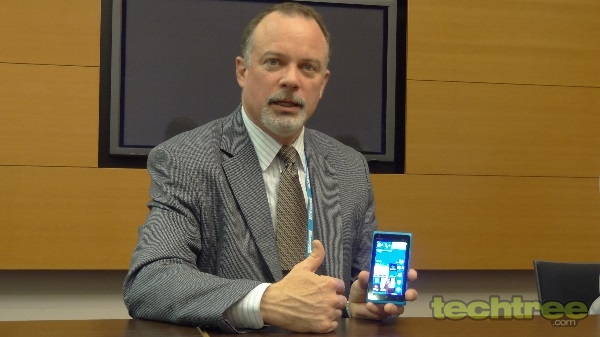While on a visit to the Microsoft TechEd Europe 2012 event held at Amsterdam, I had the chance to be part of a roundtable discussion with Greg Sullivan — Senior Marketing Manager, Windows Phone. Greg talked about a variety of topics regarding Windows Phone,such as how the new OS is a huge improvement over Windows Mobile, why current devices should not feel left in the lurch whenWindows Phone 8 is launched, and why the new mobile OS will be successful. Here are some excerpts from the question and answer session that followed:
What makes Windows Phone better than Windows Mobile?
With Windows Mobile, we built a layer of OS, licenced it to the hardware manufacturers, and allowed them to install it on any hardware they wanted, even going so far as to offer them a part of the source code to modify it in a way that suits them. However, this created application compatibility issues, as well as an inconsistency in the UI and performance of Windows Mobile 6.5 devices. It also happened that for certain applications, the hardware was not powerful enough to run smoothly. We decided to change our approach with Windows Phone. When we licence our software, we explicitly say to the hardware manufacturers that you cannot replace or modify our user experience. We've also specified a minimum set of hardware, going as far as to make it mandatory to have certain buttons on the phone. Manufacturers have to adhere to our strict guidelines, and that is what makes the user experience consistent across different manufacturers.
With Windows Mobile, we built a layer of OS, licenced it to the hardware manufacturers, and allowed them to install it on any hardware they wanted, even going so far as to offer them a part of the source code to modify it in a way that suits them. However, this created application compatibility issues, as well as an inconsistency in the UI and performance of Windows Mobile 6.5 devices. It also happened that for certain applications, the hardware was not powerful enough to run smoothly. We decided to change our approach with Windows Phone. When we licence our software, we explicitly say to the hardware manufacturers that you cannot replace or modify our user experience. We've also specified a minimum set of hardware, going as far as to make it mandatory to have certain buttons on the phone. Manufacturers have to adhere to our strict guidelines, and that is what makes the user experience consistent across different manufacturers.
How will manufacturers then be able to differentiate their WP devices from their competitors?
Manufacturers can still differentiate their hardware from others, as we haven't specified an upper limit but a lower limit. The Nokia Lumia 900 is a good example, with its polycarbonate body and superior camera.
Manufacturers can still differentiate their hardware from others, as we haven't specified an upper limit but a lower limit. The Nokia Lumia 900 is a good example, with its polycarbonate body and superior camera.
Will there be true multitasking in WP8?
Multitasking has been a topic of concern with almost every platform, as it reduces battery life and creates instability. Windows Phone 7.5 does not have true multitasking and applications do not consume any CPU cycles once they're in the background, except for music and radio. However, Windows Phone 8 will have some degree of multitasking for certain applications, such as VOIP and location-based services, which will even run under the lock screen. Thus, if I am somewhere near a Starbucks café, the relevant app will send me a notification that I can go get a free cup of coffee. At this point of time, we don't have any plan of having applications arbitrarily running in the background in WP8.
Multitasking has been a topic of concern with almost every platform, as it reduces battery life and creates instability. Windows Phone 7.5 does not have true multitasking and applications do not consume any CPU cycles once they're in the background, except for music and radio. However, Windows Phone 8 will have some degree of multitasking for certain applications, such as VOIP and location-based services, which will even run under the lock screen. Thus, if I am somewhere near a Starbucks café, the relevant app will send me a notification that I can go get a free cup of coffee. At this point of time, we don't have any plan of having applications arbitrarily running in the background in WP8.
Will all WP8 apps work on WP7.5 phones?
Every existing app today will work on WP8 devices. However, not all apps written for WP8 will work on WP7.5 devices, because the additional hardware features in the newer phones cannot be emulated in the older WP7.5 smartphones. It will still be possible to create apps that will run on both platforms, as long as the hardware limitations are considered.
Every existing app today will work on WP8 devices. However, not all apps written for WP8 will work on WP7.5 devices, because the additional hardware features in the newer phones cannot be emulated in the older WP7.5 smartphones. It will still be possible to create apps that will run on both platforms, as long as the hardware limitations are considered.
Mobile hardware is also following Moore's Law and the OS has to keep up with the pace.Apple's iOS has a yearly cycle of updates, so what about Windows Phone?
We don't yet have an update cycle, but if you look at the historic figures, we shipped WP7 in October 2010, which was a significant change from Windows Mobile 6.5. We delivered the Mango WP7.5 release in September 2011, and it was also a significant release. Finally, we announced WP8 last week, and it is architecturally even more significant than WP7.5, with a new kernel, a new app platform layer to support, and a whole new user experience. It will be launched later this year. Therefore, while we're not saying that we will deliver a new update to the OS every year, it is better to look at our track record instead.
We don't yet have an update cycle, but if you look at the historic figures, we shipped WP7 in October 2010, which was a significant change from Windows Mobile 6.5. We delivered the Mango WP7.5 release in September 2011, and it was also a significant release. Finally, we announced WP8 last week, and it is architecturally even more significant than WP7.5, with a new kernel, a new app platform layer to support, and a whole new user experience. It will be launched later this year. Therefore, while we're not saying that we will deliver a new update to the OS every year, it is better to look at our track record instead.
How will it benefit to tie WP8 with the Windows 8 desktop OS?
We haven't gone into all the scenarios, but there are certain situations in which this is beneficial, such as using NFC to tap and transfer content, and also to play a multiplayer game across the platforms. Services such as Xbox LIVE, SkyDrive, Windows LIVE, Exchange, and other Microsoft-based services will be shared and therefore make the whole experience smoother. Also, the similar user experience withLive Tiles and the Metro UI will create a level of comfort when using these devices. There are a lot more things that will be announced later this year, and you can rest assured that the tie-up of the mobile and desktop OS will bring many more benefits to the end-user.
We haven't gone into all the scenarios, but there are certain situations in which this is beneficial, such as using NFC to tap and transfer content, and also to play a multiplayer game across the platforms. Services such as Xbox LIVE, SkyDrive, Windows LIVE, Exchange, and other Microsoft-based services will be shared and therefore make the whole experience smoother. Also, the similar user experience withLive Tiles and the Metro UI will create a level of comfort when using these devices. There are a lot more things that will be announced later this year, and you can rest assured that the tie-up of the mobile and desktop OS will bring many more benefits to the end-user.


